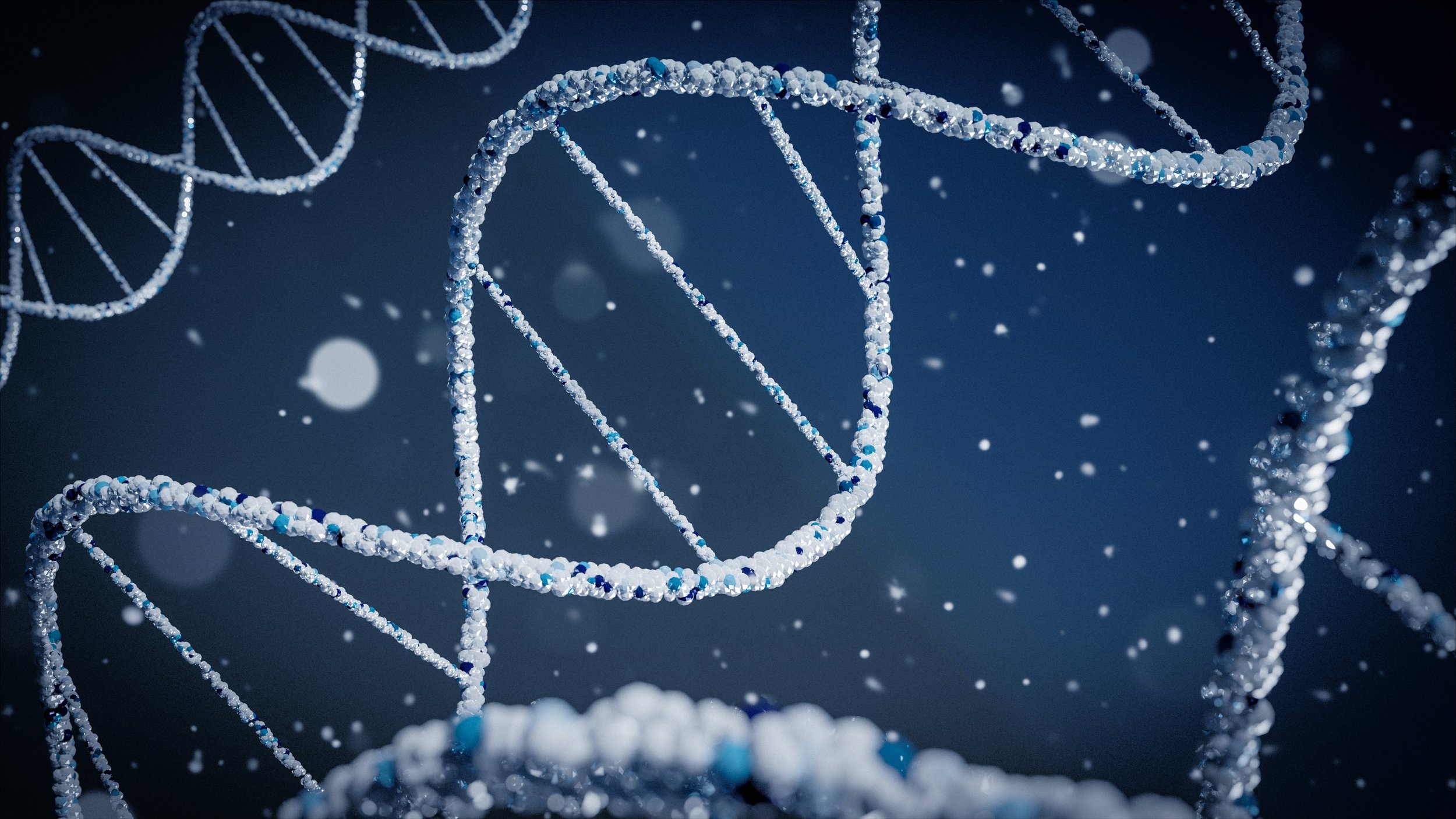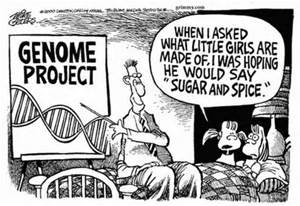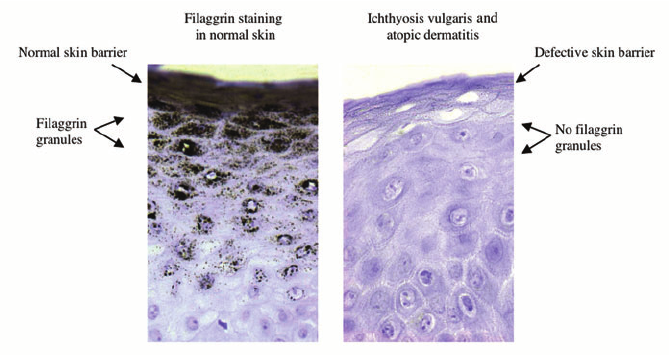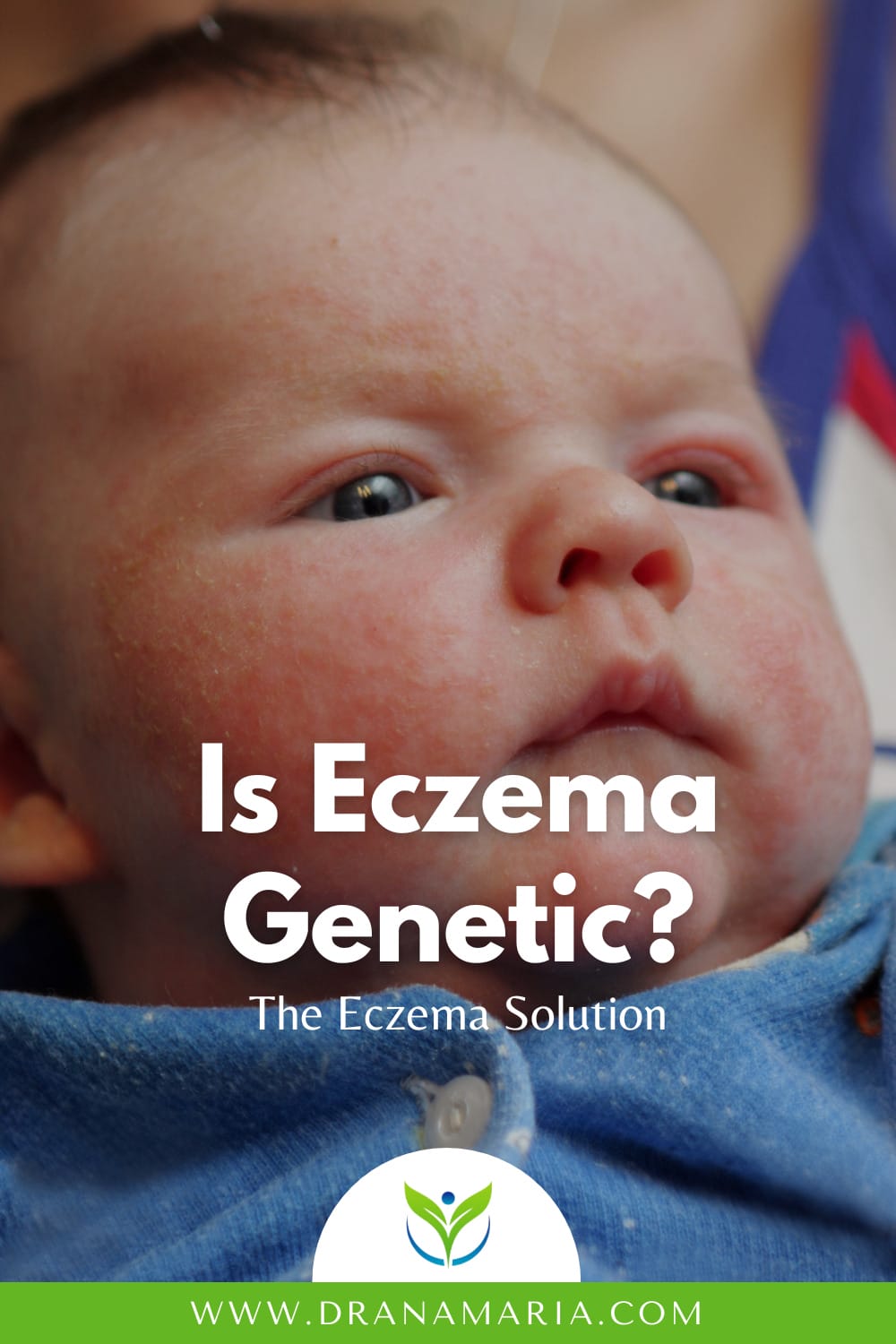In exploring the genetic origins of eczema, we question the age-old notion: Is eczema genetic? Join me on this journey to untangle the intricate interplay between our genetic makeup and the environment, challenging the belief that genes solely dictate our well-being. Explore with us as we navigate the realms where genes load the gun, and the environment pulls the trigger—an intricate dance shaping the trajectory of health and disease.

About a year ago, Jake and Amy, a new young beautiful couple, walked into my clinic with their newborn baby, Henry, in tow. As I pulled back the blanket of Henry’s car carrier, I immediately saw why they were there – their precious baby boy was covered in eczema. I gently pulled the little guy out of the carrier and peeled off his onesie. Most of Henry’s cheeks, belly and back were filled with red patchy lesions of eczema, and he was not happy about me touching them.
Amy quickly stated, “he is breastfeeding just fine and gaining weight, but he started breaking out in eczema a few weeks ago. And since the eczema started, sleep has gotten worse and so has bath time.” I noticed Jake nod his head, but otherwise remained stoic with his arms crossed while sitting across the room. After examining Henry, I asked all my usual questions about Henry’s development, life at home, and adjusting as first time parents.
60% of eczema appears during the first year of life
I then began to discuss Henry’s eczema, and explained that 60% of eczema appeared during the first year of life. I also explained the inflammatory bucket and how genetic factors affect how the bucket is filled. But as I began to discuss how the pregnancy and environmental factors play a role in eczema development, Jake just started shaking his head in disbelief. Clearly he did not like what I was saying. I asked him if something was wrong, and he replied, “Listen, I had eczema when I was a kid, and so we know it’s genetic. Plus, he’s only 4 months old, so he hasn’t been around long enough for ‘environmental factors’ to even play a role in this.”
And with that, he shrugged, and mentally checked out of the appointment. I wish I could tell you this was the first time I heard this from a father – or even from a mother for that fact. But dads tend to be the most absolute about it.

Have you ever experienced an illness, mild or severe, like thyroid issues, anxiety, or ear infections and were told it was genetic and thus, there was nothing you could do to prevent it? Have you ever felt helpless because your genes had caused your illness? I think it’s worth a discussion to determine if what dad said held any truth.
I can remember through much of my earlier life thinking most of our health issues were either genetic (defined in our DNA) or infectious (caused by some bacteria, virus, or other organism). But over the last 5-10 years, I have learned that genetics may put certain individuals at risk of disease, but it’s their environment that causes the disease to manifest itself. Put another way – genetics load the gun, but our environment pulls the trigger.
Much work has been done to look for the genetic origins of eczema – after all, it affects more than 20% of children worldwide and up to 10% of adults. Thus, if a genetic origin were found, it could possibly be a target for genetic therapies. So let’s take a look at some genetic evidence.
The Genetic Evidence
The most obvious evidence for a genetic link lies in the tendency for eczema to run in families. Studies have indicated a three- to fivefold increased risk for a person to develop eczema if one or both parents have a history of eczema. Just like Jake in the story above, it is quite common for me to see a child with eczema, and one or both parents describe a history of eczema in themselves or one of their family members. In fact, the first descriptions of eczema type disease in families goes back 2,000 years, when ancient Romans described that Emperor Augustus (63 BC to 14 AD) had dry, itchy patches on his skin and suffered from a seasonal respiratory disorder, and both his grandson and his great grandnephew suffered from similar symptoms.
Beyond simply looking at families though, we can now actually look at a human’s blueprint. When the human genome was mapped in 2004, it revolutionized the genetic aspect of medicine. We could now compare the DNA of individuals with a particular disease to those without disease and look for the differences in their DNA. Also, remember that each human has 2 copies of a gene, one from mom and one from dad. So even if one is damaged, the other gene may be working well.

When this concept was applied to eczema, a mutation in the FLG gene that encodes for a protein called filaggrin was the strongest association. Between 20–30% of people with eczema have an FLG gene mutation. Filaggrin plays an important role in the structure of the outermost skin layer, helping to create a watertight barrier. It also is important for the skin’s natural moisturizing process and maintaining correct skin acidity (pH). When mutations in filaggrin occur, the skin barrier is defective allowing toxins, bacteria, and substances that can cause allergic reactions (allergens), such as pollen and dust mite to enter the skin. This is likely why patients with the FLG gene mutation are also at higher risk of eczema.

Another gene that plays a role in the development of eczema is KIF3A, which codes for a protein involved in cell communication and transport. A mutation in this gene leads to the skin barrier becoming weakened and water loss from the skin, increasing eczema risk.
Thirdly, the CARD11 gene carries the information to make a protein that is necessary for the proper functioning of white blood cells (lymphocytes). Lymphocytes are immune cells that protect the body from infections and play a role in eczema. Mutations in the CARD11 gene can result in eczema due to a weakened immune system. Researchers have identified at least five CARD11 mutations that may be present in people with eczema.
So it’s possible little Henry inherited a damaged copy of one of these genes from dad, or that sometime during development the gene mutated and developed errors. But it’s also possible that the gene was not active until it was activated by some environmental factor. And this is where everything gets interesting – and murky.
Check out my holistic eczema program
You see, the information stored in our DNA is not enough per se to completely explain human development, physiology and disease. The ways these genes are expressed is really what determines if we develop a particular disease. And there are a whole lot of factors that contribute to how a gene is expressed – enter the field of epigenetics.
Epigenetics
Epigenetics is the study of how your behaviors and environment can cause changes that affect the way your genes work. Unlike genetic changes, epigenetic changes are reversible and do not change your DNA sequence, but they can change how your body reads a DNA sequence.
So in Henry’s case, although he may have inherited a damaged copy of a gene from his dad Jake, it may have been the antibiotics he received at birth that changed the way his genes were expressed and started the eczema process. This is likely why so many different factors have been identified to have relationships with eczema – birth factors like maternal stress and diet, c-sections, antibiotics, reflux medications, and the microbiome to name a few.
The good news here is that we have the power to alter our gene expression with our behavior and environment. So you can’t pick your mom and dad, but you can influence how their diseases may or may not affect you. (Unfortunately, I have not been able to influence my own father’s gene expression that I am habitually late and I can never find my keys).
Our Microbiome expands our genetics
Our discussion so far has focused on human genetics, but we would be remiss if we didn’t mention the other major genetic elephant in the room – our microbiome. You see, we each harbor nearly 1,000 different species of bacteria on our bodies, and those bacteria contain thousands of genes which help to expand the human genome. Each of us carry a different combination of bacteria giving us a unique microbiome fingerprint that is like no other.
And here is the crazy part – the bacterial genes affect the function of our human genes. And when we damage or alter our microbiome, we are going to have downstream effects on our own gene expression. And our microbiomes are inherited just like our DNA – so it’s possible that a number of the “inherited” diseases we see may actually be related to our inherited microbiome as much as our inherited DNA from mom and dad- mind blown!
As I finished up my comprehensive powerpoint discussion on epigenetics and the human microbiome 3.5 hours later, Jake had a totally different look on his face. Although he was curled up in the fetal position in the corner, at least his arms were no longer crossed. As he rose from the floor, a smile spread across his face. He said, “Doc, I guess I need to rethink my ‘It’s all in your genes’ theory, huh?” I brightly replied “Now let’s take a look at the environment and change the expression of those genes.”
If you can consider for a moment that we have the power to change our genes by modifying our environment and thus can alter the course of chronic disease, then my holistic eczema program may be right for you. Check it out here!
Yours in Good Health,
Drs. Ana-Maria and John Temple

Was this helpful? Save it for later!





